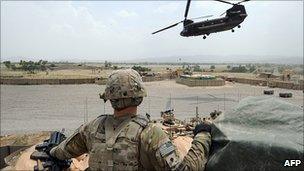Obama's Afghanistan pullout plan pleases few
- Published
- comments

The US will have some 70,000 troops in Afghanistan after September 2012
There's cold comfort for President Obama from his military advisers.
The head of the Joint Chiefs of Staff, Adm Mike Mullen, has told a congressional committee he backs the decision to bring the surge troops home rapidly. But he didn't at first, and thinks it's risky.
He told a committee, external: "I am comfortable that conditions on the ground will dominate - as they have dominated - future decisions about our force posture in Afghanistan. Let me be candid, however. No commander ever wants to sacrifice fighting power in the middle of a war. And no decision to demand that sacrifice is ever without risk."
He then added: "I would prefer not to discuss the specifics of the private advice I rendered with respect to these decisions. As I said, I support them. What I can tell you is, the president's decisions are more aggressive and incur more risk than I was originally prepared to accept.
"More force for more time is, without doubt, the safer course. But that does not necessarily make it the best course. Only the president, in the end, can really determine the acceptable level of risk we must take. I believe he has done so."
Then, answering questions about the wider region - in other words Pakistan and India - "I worry we'll be back, but it'll be more dangerous and more challenging."
All round there's plenty of criticism. In one blog a former marine argues, external the decision is "strategically myopic and tactically dangerous".
This opinion piece, external says the president has confirmed America's decline and echoes dangerous words about Vietnam.
Democrats think it is not quick enough, external, with their leader in the House Nancy Pelosi saying: "It has been the hope of many in Congress and across the country that the full drawdown of US forces would happen sooner than the president laid out - and we will continue to press for a better outcome."
So, few love the plan. But I suspect a lot of this is Beltway chatter.
I await the first opinion polls after the speech but I suspect many Americans will welcome the president refocusing on what he called "nation-building at home".